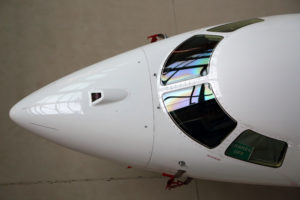 Many people who desire to purchase a private aircraft are interested in whether the purchase price and operating expenses may be deducted on their income-tax return. In other words, will Uncle Sam subsidize my purchase and use of an aircraft? The answer is: Possibly.
Many people who desire to purchase a private aircraft are interested in whether the purchase price and operating expenses may be deducted on their income-tax return. In other words, will Uncle Sam subsidize my purchase and use of an aircraft? The answer is: Possibly.
Under current law, the only path to deducting aircraft expenses is under Section 162(a) of the Internal Revenue Code, which allows deducting “ordinary and necessary” expenses incurred in carrying on any “trade or business.” The key is whether a “trade or business” exists in which the aircraft is used to support. Vastly simplified, a “trade or business” is an activity that is entered into with the expectation of profit, and in which the taxpayer’s activities are considerable, continuous and regular. Examples would include developing software for sale to the public, providing financial or legal services to clients, or manufacturing tangible goods for sale to customers. A trade or business would not exist where the taxpayer does not make significant efforts to generate and collect income, such as purchasing real property, securities, financial products, or collectibles for investment purposes.
The next question is whether the costs of a private aircraft are “ordinary and necessary.” Determining this involves asking more questions, such as: Does my trade or business require me to travel by air? Does private aircraft travel provide advantages over travel on commercial airlines (e.g. service to small airports, complex multi-city itineraries)? Does a private aircraft allow more employee productivity or allow the business to produce more income? Is the aircraft size and cost-profile appropriate for the missions and intended passengers? A skeptical IRS auditor may ask you all of these questions.
Current law allows new and used aircraft flown at least 50 percent or more of the time in connection with a trade or business to qualify for 100 percent bonus depreciation in the year they are placed in service. This benefit continues until December 31, 2022, and then reduces to 80 percent in 2023, and reduces in future years by 20 percentage points until disappearing entirely in 2027. If you sign a “written binding contract” to purchase an aircraft in 2022, but don’t place the aircraft in service until 2023, you can still qualify for 100 percent bonus depreciation, provided the agreement meets certain conditions. Without bonus depreciation, as long as you meet the 50 percent trade-or-business test, you can still depreciate the aircraft on the accelerated 5-Year or 7-Year MACRS schedule (depending on whether the aircraft is primarily used in charter). You must continue to meet the 50 percent test for the five or seven years after you purchase the aircraft, in order to keep the depreciation benefit.
Other parts of current law can limit the benefit of bonus depreciation and other cost deductions. Examples include the limitation under Section 461(l) on excess business losses (100 percent bonus depreciation can create big losses on your tax return) that pushes the benefit into future tax years; deferral of losses for passive activities under Section 469, which include leasing the aircraft out to the public for charter; Section 280F limitations on depreciation for aircraft leased to related parties or used personally by employees; limitations under Section 274 on deductions related to employee commuting between a personal residence and the primarily place of employment or personal entertainment use. Recent law changes have also eliminated deductions for entertainment even when related to bona fide business meetings or discussions.
Attorneys at Aero Law Group PC are happy to discuss income-tax planning questions you may have with respect to private aircraft, as well as purchase agreements and other structuring matters.

